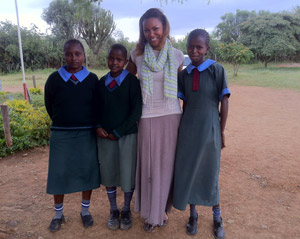 Raised in the projects in Warren, Ohio, cancer-survivor Kimberly Merrell ’07 has always been a fighter. “I grew up in the midst of some pretty difficult circumstances,” she says. “The Lord has allowed those experiences to benefit me now.”
Raised in the projects in Warren, Ohio, cancer-survivor Kimberly Merrell ’07 has always been a fighter. “I grew up in the midst of some pretty difficult circumstances,” she says. “The Lord has allowed those experiences to benefit me now.”
Kimberly is the founder of the Live Foundation, a non-profit that partners with indigenous organizations around the world who champion change in their own communities—especially gender oppression—while encouraging Christ's church to do justice on their behalf through partnerships. “Work of justice is not something that we can do as extracurricular activity,” she says. “As the Church, we’re called to do this.”
In high school, Kimberly wanted to be a foreign exchange student. Since her family didn’t have the necessary funds, she started baking and selling cookies at the local flea market. In just three months, she garnered community support and raised the needed $7,000 to travel to Brazil. While there she was riding on the super highway in Rio de Janeiro and was able to see the expansive commerce center on one side with its great wealth and the seemingly endless favelas on the other. “These worlds needed to meet,” she said. It was then that Kimberly felt called to missions.
She entered seminary as an evening student in 2001 and four years later was diagnosed with ovarian cancer. During chemo treatments, Kimberly was forced to minimize her load to only one PTS class. “While lying there unable to move in my bed, my mind would actively wrestle with class discussions and readings from my remaining feminist/womanist theology class taught by Dr. Susan Nelson. That class gave me the strength to get through,” she says.
Kimberly’s passion for her current ministry began in 2006 when she received the Seminary’s Valentour World Travel Fellowship. During that time, she studied women’s issues in the global context visiting Kenya, India, Indonesia, and Singapore. While in Africa, Kimberly had her first encounter with the Samburu tribe. Given their remote geographical location, she explains, Samburu culture is often able to supersede Kenyan law. So while it is illegal for women younger than 18 to marry, they do it anyway. Girls are hindered from attending or completing school. And, female genital mutilation is widespread.
“Girls as young as six are being married off into a polygamous system,” she says. “These girls are entering into situations that may include two to three other wives who treat her like a slave, a man raping her, and prior to marriage circumcision.”
Recently Kimberly traveled to Africa and met with pastors there. “Churches in these areas could be catalysts for change, but many of the pastors can’t see the issues because they are blinded by their own societal norms. As an outsider, I can shed light on these atrocities through illuminations in our shared gospel.” Additionally, the Foundation is working to connect tribes in Africa that are successfully working to eradicate gender oppression.
Churches in the States can get involved in the Foundation’s mission. “You can pray,” says Kimberly. “We’re dealing with centuries-old issues. Programs and initiatives won’t work unless the hearts of people are affected.”
Of the Foundation’s name, Kimberly says, “’Live’ is a declaration derived from John 10:10, ‘I came that they may have life, and have it abundantly.’” Thankfully, this warrior is dedicated to ensuring that someday this is a reality for African girls. If you’re interested in supporting the Live Foundation or inviting Kimberly to speak to your small group or congregation visit www.thelivefoundation.org.
